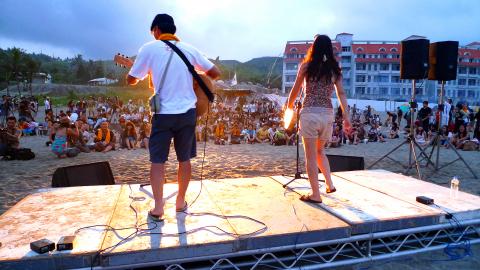Taipei’s oldest rock club, Underworld, closed its rusty metal gate for the last time last Sunday just after midnight to avoid steep government fines. Several hundred people lingered outside in the nearby park for hours longer as part-owner Ho Tung-hung (何東洪) thanked the staff, DJs and others who had helped keep the club running for 16 years. Ho, a professor at Fujen Catholic University, has now expanded the club’s fight towards the creation of a bulletproof legal status for live houses in all of Taiwan. In press conferences and editorials, Ho and other supporters have made repeated calls for Minister of Culture Lung Ying-tai (龍應台) to orchestrate a legal solution. So far, she has responded only through short press releases, expressing vague sympathies but promising no action. So Underworld supporters continue to organize, hold meetings and make creative Facebook posts. There are currently no plans to relocate or re-open.
Meanwhile, a protest concert is brewing in Taitung over a different controversy. The Fudafudak Concert — named after an expletive in the Amis language — will pit a group of Taiwan’s best singers, aboriginal rights activists and environmentalists against the local government and a hideous hotel construction scheme. Alas, it seems Live Wire is becoming a column about musicians against corrupt property developers. Well, here are the details.
Fudafudak will be held on Shanyuan Beach (杉原沙灘) next Saturday, July 28, though all are invited to come camp on the beach from July 21 to 29. In addition to being on one of the area’s prettiest, yellow-sand beaches, the event also draws from Taiwan’s most concentrated pool of aboriginal musicians, several of whom are famous recording artists who live in the area. The female singer Ilid Kaolo (以莉.高露), who used to perform under the name Hsiao Mei (小美), was awarded the Best New Singer in the most recent Golden Melody Awards. And just to be clear, her award was not for Best Aboriginal Singer (though she won that too), it was for best new singer, period. She’ll join a lineup of aboriginal-folk all-stars that includes Panai (巴奈), Kimbo Hu (胡德夫), Takanow (達卡鬧) and Long Ge (龍哥) as well as some very fun Taipei bands like Relax One (輕鬆玩) and the polymath, multicultural rap group Kao Chou Ching (拷秋勤). There will be about 20 acts in all. This will also be an extremely unique chance to see aboriginal musicians playing outdoors, in front of a sizable home crowd and on ground that they consider sacred. Last year’s first Fudafudak drew around 1,000 people, according to the organizer’s estimates. Given the huge aboriginal population in the area, this concert could achieve ritual-type dimensions. And no one would be surprised if singing broke out among the setup crew every night of the week. Best of all, it’s completely free, though donations are requested. It’s a very good cause.

Photo courtesy of Huang Fu-kwei
The concert’s goal is to keep the beach free and open to the public. That means ridding it of a sputtering construction project that has blocked the beach entrance since 2005. The construction of the Miramar Resort Village (美麗灣渡假村) was first approved by local authorities in 2004, and within two years, developers managed to build a five-storey, 250-meter-long hotel complex before ever bothering to apply for an environmental impact assessment. Activists consider the construction to be illegal and say it should be torn down. Aboriginal groups claim the beach to be sacred ground. Their actions have stalled the project, and the High Court has ordered construction to stop on several occasions, most recently in January. In June, however, the Taitung County Government gave developers a new permit to continue building, saying the problems were only “procedural.” Taiwan proper only has about a dozen beaches that are good for tourism. It has already built nuclear power plants on two of them (Fulong and Nanwan), and ten years ago it essentially sold a gorgeous beach inside a national park (Dawan in Kenting) to a sorry excuse for a luxury hotel owned by a steel company (The Chateau). Every person in Taiwan with a shred of conscience is against this Miramar Resort. When will the government figure this crap out?
Shanyuan Beach is located about 6km north of Taitung City on the coastal highway. For concert information, search “Taidong Protest Concert” on Facebook or check: www.gigguide.tw/event-5543.
The Blues Society on Taiwan will host its first ever Blues Cruise next Saturday, and the event features dinner, bands and drinks on a Mississippi-style riverboat on the Tamsui River .

Photo: Chen Hui-ling, Taipei Times
Now, if you get really drunk and try to say “booze cruise,” it may very well come out as “blues cruise.” As in, “I drank fishteen martinis on the blooze cruise, and boy was it aweshome.” We’re pretty sure this is exactly how they intended it, and it’s probably how they came up with the name too.
The performers are the Muddy Basin Ramblers, BoPoMoFo (ㄅㄆㄇㄈ), Blues Vibrations, Shun Kikuta, Mike Mudd, Nick Brown and B.B. Cooky. The four-hour excursion includes a Cajun dinner by Capone’s head chef, W. Hunter DiLeo, and one drink. Tickets were $1,500, but the event is already sold out, begging the question, why are we teasing you with it? Sorry, we’ll try to let you know earlier next time, as this sounds like fun. They even want to people to dress like James T. West, Artemis Gordon and the various femme fatales of The Wild Wild West.
BSoT Blues Cruise, Saturday, July 28 from 5-9pm, at Guandu Wharf (關渡碼頭). Reservations: (02) 2858-5966, or through Capone’s or the Tavern.

The 1990s were a turbulent time for the Chinese Nationalist Party’s (KMT) patronage factions. For a look at how they formed, check out the March 2 “Deep Dives.” In the boom years of the 1980s and 1990s the factions amassed fortunes from corruption, access to the levers of local government and prime access to property. They also moved into industries like construction and the gravel business, devastating river ecosystems while the governments they controlled looked the other way. By this period, the factions had largely carved out geographical feifdoms in the local jurisdictions the national KMT restrained them to. For example,

The remains of this Japanese-era trail designed to protect the camphor industry make for a scenic day-hike, a fascinating overnight hike or a challenging multi-day adventure Maolin District (茂林) in Kaohsiung is well known for beautiful roadside scenery, waterfalls, the annual butterfly migration and indigenous culture. A lesser known but worthwhile destination here lies along the very top of the valley: the Liugui Security Path (六龜警備道). This relic of the Japanese era once isolated the Maolin valley from the outside world but now serves to draw tourists in. The path originally ran for about 50km, but not all of this trail is still easily walkable. The nicest section for a simple day hike is the heavily trafficked southern section above Maolin and Wanshan (萬山) villages. Remains of

With over 100 works on display, this is Louise Bourgeois’ first solo show in Taiwan. Visitors are invited to traverse her world of love and hate, vengeance and acceptance, trauma and reconciliation. Dominating the entrance, the nine-foot-tall Crouching Spider (2003) greets visitors. The creature looms behind the glass facade, symbolic protector and gatekeeper to the intimate journey ahead. Bourgeois, best known for her giant spider sculptures, is one of the most influential artist of the twentieth century. Blending vulnerability and defiance through themes of sexuality, trauma and identity, her work reshaped the landscape of contemporary art with fearless honesty. “People are influenced by

Ten years ago, English National Ballet (ENB) premiered Akram Khan’s reimagining of Giselle. It quickly became recognized as a 21st-century masterpiece. Next month, local audiences get their chance to experience it when the company embark on a three-week tour of Taiwan. Former ENB artistic director Tamara Rojo, who commissioned the ballet, believes firmly that if ballet is to remain alive, works have to be revisited and made relevant to audiences of today. Even so, Khan was a bold choice of choreographer. While one of Britain’s foremost choreographers, he had never previously tackled a reimagining of a classical ballet, so Giselle was